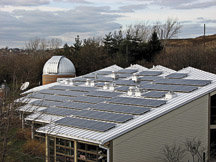Two companies have been selected to install solar panels at three designated sites in Secaucus as part of a regional cooperative effort between the town, the New Jersey Meadowlands Commission (NJMC), and the Borough of Little Ferry.
Through the effort, the two companies, SunLight Green Capital and Mercury Solar Systems, will install solar panels at the municipal parking lot at Town Hall, Secaucus High School, and Huber Street Elementary School, including the Huber parking lot.
Over the projected 15-year lifespan of the panels, Secaucus should save an estimated $1.2 million on the town’s municipal energy bill, which will help taxpayers.
Under the NJMC Solar Co-op pilot program, the contractors will help the town trim energy costs without any expense for local taxpayers.
The contractors will earn their profits by selling “renewable energy” to the municipality.
“The contractors, SunLight Green Capital and Mercury Solar Systems, will install everything at their expense. Then we buy the energy back at a reduced [rate],” explained Town Councilman Gary Jeffas, a member of the governing body’s Energy Committee.
The town should save an estimated $1.2 million.
____________
Through what became known as the NJMC Solar Co-op Evaluation Team, “we joined forces with Little Ferry for some of our buildings to be studied,” said Jeffas. “This is part of an ongoing longer term effort to look at ways we can take advantage of green energy in town to both reduce costs, but also meet our environmental needs as well.”
SunLight Green Capital and Mercury Solar Systems should begin to install solar panels at the three Secaucus sites in January.
Cleaner air
The 1.5 megawatt photovoltaic system at the three Secaucus locations will eventually be the source of 18 percent of the energy generated at the high school, 91 percent of the energy generated at Huber, and 26 percent of the energy generated at Town Hall.
In addition, the solar energy system created will, according to town officials, produce cleaner air for residents that will have the effect of removing 1,018 metric tons of greenhouse gasses and 114,086 carbon dioxide emissions from gasoline, among other benefits.
Town Administrator David Drumeler said the energy produced by the system will not be sold off to other customers, but will be used completely by municipality and Secaucus Public School District.
Ahead of scheduled state mandates
As a part of its Municipal Solar Assistance Program, the NJMC spent nearly two years evaluating rooftops throughout the Meadowlands District to see which ones might be best used for renewable energy.
Agency officials said they tried to undertake this plan ahead of upcoming state mandates. Under New Jersey’s Energy Master Plan, 30 percent of the state’s electricity must come from sustainable energy sources, such as sun or wind, by 2020. And by law, New Jersey must generate 4,335 megawatts of state-based solar energy by 2026.
“The NJMC’s Municipal Solar Assistance Program can help Meadowlands towns reap the benefits of using clean, low-cost solar power without having to spend taxpayer dollars,” said former NJMC Executive Director Robert Ceberio last year. “The program is an excellent example of how the commission strives to use its resources to help reduce local government costs and improve residents’ quality of life.”
Although in its initial phase the state agency worked with only a handful of municipalities, it has now expanded the program to all 14 of the state-designated Meadowlands District towns. The NJMC believes the region will benefit most by having a larger-scale program than what was initially planned. The program also will now include solar panels at ground level, in addition to ones on rooftops.
More green on the way
Jeffas said last week that the panels’ installation at Town Hall and the two school facilities is just the first step toward green energy in Secaucus. The municipality, he added, is already looking at other available opportunities to expand renewable energy options locally.
Drumeler is, for example, in talks with Hudson County regarding another green energy cooperative that might get underway soon. And the Energy Committee is trying to see if there are other school or municipal buildings in town that might qualify for other pilot projects similar to the NJMC Solar Co-op.
E-mail E. Assata Wright at awright@hudsonreporter.com.
